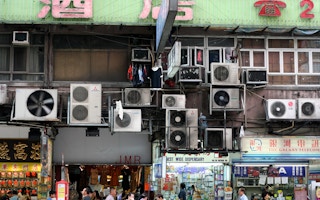A whopping 14 billion cooling appliances could be needed worldwide by 2050 as climate change raises temperatures, and countries must adopt energy-efficient and climate-friendly cooling as part of their post-pandemic recovery plans, urged the United Nations Environment Programme (UNEP) and International Energy Agency (IEA).
To continue reading, subscribe to Eco‑Business.
There's something for everyone. We offer a range of subscription plans.
- Access our stories and receive our Insights Weekly newsletter with the free EB Member plan.
- Unlock unlimited access to our content and archive with EB Circle.
- Publish your content with EB Premium.
There are 3.6 billion cooling appliances in use now, and rising demand for cooling could mean even higher emissions from the burning of fossil fuels to power air-conditioners and other equipment, both agencies noted in a new report released on Friday (17 July).
Efficient and climate-friendly cooling is a crucial piece of the climate and sustainable development puzzle, they said.
“We need cooling to protect vulnerable populations from heatwaves, keep vaccines viable and food fresh, and workforces productive. It is essential for equity and development, especially as climate change raises global temperatures,” said the UNEP and IEA.
“The global pandemic has emphasised just how important cooling is to society, with many stuck indoors in hot climates during lockdowns and global cooling infrastructure essential to storing and delivering an eventual vaccine.”
Eight years’ worth of global emissions could be avoided
If countries cooperate and throw their weight behind earth-friendly cooling solutions, they could avoid as much as 460 billion tonnes of greenhouse gas emissions over the next four decades. This amount is roughly equal to eight years of global emissions at 2018 levels, UNEP and IEA said in their 48-page Cooling Emissions and Policy Synthesis Report: Benefits of cooling efficiency and the Kigali Amendment.
The Kigali Amendment is the latest amendment to the 1987 Montreal Protocol, an international treaty to protect the ozone layer by phasing out chlorofluorocarbons (CFCs). The phase-out of CFCs led to the introduction of replacement compounds including hydrofluorocarbons (HFCs), which do not deplete the ozone layer but are powerful greenhouse gases. The Kigali Amendment, which entered into force on 1 January 2019, aims to cut the production and consumption of HFCs by 2047, and has the potential to avoid as much as 0.4°C of global warming by 2100.
“
The global pandemic has emphasised just how important cooling is to society, with many stuck indoors in hot climates during lockdowns and global cooling infrastructure essential to storing and delivering an eventual vaccine.
Cooling Emissions and Policy Synthesis Report
Cool opportunities
There are many opportunities to invest in cooling while averting the catastrophic effects of climate change, said the report, which incorporated scientific inputs from many experts and organisations.
Policymakers can roll out National Cooling Action Plans and identify opportunities to incorporate efficient cooling into their Paris Agreement commitments to curb global warming.
They can implement energy efficiency labelling and minimum energy performance standards for equipment and appliances. A recent report by environmental measurement non-profit CDP found that companies that make air-conditioners and refrigerators were not innovating or promoting their most energy-efficient products.
Policymakers can draft building codes that reduce demand for refrigerants and mechanical cooling, by improving the design of urban spaces and buildings, integrating district cooling into urban planning, as well as adopting nature-based solutions such as green roofs and shady trees.
Existing equipment can be retrofitted and replaced with alternatives of lower or zero global warming potential.
Ozone-depleting substances and HFC refrigerants from products that have reached their end-of-life should also be recovered, reclaimed and destroyed. Currently, there is rarely funding or incentives to do so, resulting in the danger of these substances leaking from storage tanks or discarded equipment, the report stated.
Sustainable cold chains are also an important part of climate action, according to the UNEP and IEA. The lack of adequate cold chains is responsible for the loss of about 9 per cent of perishable foods produced in developed countries, and 23 per cent in developing countries. Improved cold chains can reduce food loss, increasing the level of avoided carbon emissions.
“As governments roll out massive economic stimulus packages to deal with the economic and social impacts of the Covid-19 crisis, they have a unique opportunity to accelerate progress in efficient, climate-friendly cooling,” said Dr Fatih Birol, executive director of the International Energy Agency.
“Higher efficiency standards are one of the most effective tools governments have to meet energy and environmental objectives. By improving cooling efficiency, they can reduce the need for new power plants, cut emissions and save consumers money,” said Birol.








